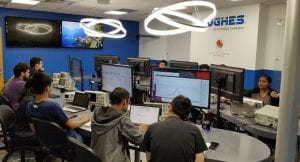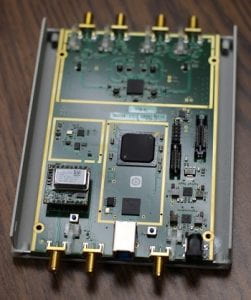Hughes Software Defined Radio Laboratory

The Hughes Software Defined Radio Laboratory provides hands-on experience, where students learn to work with the Ettus B210 software-defined radio, using GNU Radio on Linux machines, with timing provided by an Ettus OctoClock-G DCA-2990.
The boards are two-channel USRP devices with RF coverage from 70 MHz – 6 GHz. It provides up to 56MHz of real-time bandwidth. Each board works with an AD9361 RFIC RF front end, and a Spartan6 FPGA. Each board is 2×2 MIMO capable. Stand-alone, the USRP B210 has a TCXO reference accuracy of ±75 ppm, but when connected to the OctoClock-G, the accuracy improves to ±75 ppm.

The computing facilities supporting the USRP in each station are Intel NUC7i7BNHX1 Mini PCs with 16GB, 2400 MHz memory, and 250 GB SSD. Students will control the USRP by learning to use the USRP Hardware Driver (UHD), which is an open-source driver providing API for frameworks such as GNU Radio, C/C++, Python, and Matlab.
One of the Program’s core courses will have students working with the B210 and GNU Radio to generate signals, communicate between lab stations using different modulation, like PSK or QAM, perform spectral analysis, in addition to equalizing, pulse shaping, and performing synchronization.
The Program also endeavors to provide advanced wireless electives where students can create OFDM signals and adaptive spectral occupancy, and experiment with 2×2 MIMO using Alamouti’s space-time block coding.